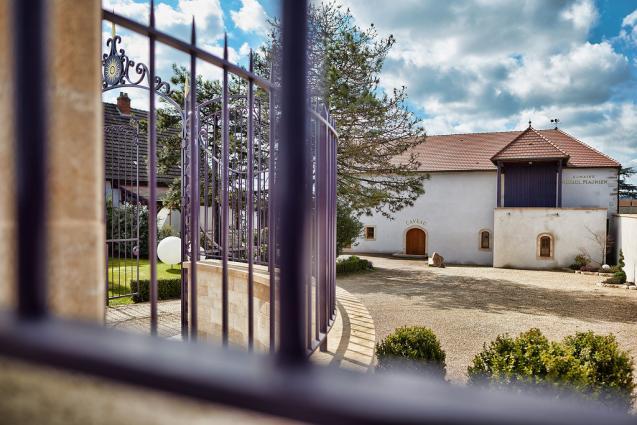Michel Magnien Clos de la Roche
Michel Magnien Clos de la Roche
Domaine Michel Magnien has evolved into a Burgundy producer of a singular style and philosophy from cellars located in the village of Morey-Saint-Denis. In 1993, Frédéric Magnien persuaded his father Michel to begin domaine bottling. The domaine is now certified biodynamic by Demeter and the wines are produced without the use of new oak.
The domaine’s 45 acres are spread across the villages of Morey-Saint-Denis, Gevrey-Chambertin, Chambolle-Musigny, and Vosne Romanée, with holdings in several premier cru and grand cru vineyards. These include the grand crus Clos de la Roche, Clos Saint-Denis, and Charmes-Chambertin. Frédéric Magnien maintains an average vine age of 50 years
Clos de la Roche Grand Cru gives the biggest and most structured wine of Morey-Saint-Denis’ five grand crus thanks to its meager top soil and limestone bedrock. The vines here are in contact with the rock, resulting in a muscular wine with intense flavors of fruit and minerals. The wine is a pure expression of its terroir thanks to its élevage in a combination of used oak and clay jars.
Tasting Notes
Deep color and an intense aroma of dark fruit suggest a wine of volume and concentration. Black cherries, licorice, and sandalwood combine with floral and herbal notes on the nose. Rich and concentrated fruit flavors on the palate are accompanied by firm tannins and a lingering mineral finish.
Food Pairing
Red Burgundy might be the world’s most flexible food wine. The wine’s high acidity, medium body, medium alcohol, and low tannins make it very food-friendly. Red Burgundy, with its earthy and sometimes gamey character, is a classic partner to roasted game birds, grilled duck breast, and dishes that feature mushrooms, black truffles, or are rich in umami.
Domaine Michel Magnien has evolved into a Burgundy producer of a singular style and philosophy from cellars located in the village of Morey-Saint-Denis. In 1993, Frédéric Magnien persuaded his father Michel to begin domaine bottling. The domaine is now certified biodynamic by Demeter and the wines are produced without the use of new oak.
The domaine’s 45 acres are spread across the villages of Morey-Saint-Denis, Gevrey-Chambertin, Chambolle-Musigny, and Vosne Romanée, with holdings in several premier cru and grand cru vineyards. These include the grand crus Clos de la Roche, Clos Saint-Denis, and Charmes-Chambertin. Frédéric Magnien maintains an average vine age of 50 years
Clos de la Roche Grand Cru gives the biggest and most structured wine of Morey-Saint-Denis’ five grand crus thanks to its meager top soil and limestone bedrock. The vines here are in contact with the rock, resulting in a muscular wine with intense flavors of fruit and minerals. The wine is a pure expression of its terroir thanks to its élevage in a combination of used oak and clay jars.
Tasting Notes
Deep color and an intense aroma of dark fruit suggest a wine of volume and concentration. Black cherries, licorice, and sandalwood combine with floral and herbal notes on the nose. Rich and concentrated fruit flavors on the palate are accompanied by firm tannins and a lingering mineral finish.
Food Pairing
Red Burgundy might be the world’s most flexible food wine. The wine’s high acidity, medium body, medium alcohol, and low tannins make it very food-friendly. Red Burgundy, with its earthy and sometimes gamey character, is a classic partner to roasted game birds, grilled duck breast, and dishes that feature mushrooms, black truffles, or are rich in umami.




















